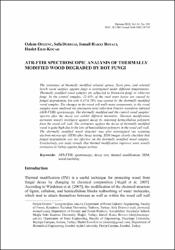| dc.contributor.author | Özgenç, Özlem | |
| dc.contributor.author | Durmaz, Sefa | |
| dc.contributor.author | Boyacı, İsmail Hakkı | |
| dc.contributor.author | Eksi-Koçak, Haslet | |
| dc.date.accessioned | 2020-11-20T14:50:40Z | |
| dc.date.available | 2020-11-20T14:50:40Z | |
| dc.date.issued | 2018 | |
| dc.identifier.issn | 1644-3985 | |
| dc.identifier.uri | https://doi.org/10.12841/wood.1644-3985.247.02 | |
| dc.identifier.uri | https://hdl.handle.net/20.500.12809/1595 | |
| dc.description | 0000-0002-3880-0033 | en_US |
| dc.description | WOS: 000444723300007 | en_US |
| dc.description.abstract | The resistance of thermally modified oriental spruce, Scots pine, and oriental beech wood samples against fungi is investigated under different temperatures. Thermally modified wood samples are subjected to brown-rot fungi or white-rot fungi. In the control samples, 32-43% of the total mass losses are caused by fungal degradation, but only 0.47-0.78% was caused by the thermally modified wood samples. The changes in the wood cell walls main components, in the wood samples were analysed via attenuated total reflection Fourier transform infrared (ATR-FTIR) spectroscopy. The thermally modified and the control wood samples' spectra after the decay test exhibit different intensities. Thermal modification increases wood's resistance against decay by removing hemicellulose polymers from the wood cell wall. The resistance against the decay of thermally modified wood is quite high due to the loss of hemicellulose polymers in the wood cell wall. The thermally modified wood structure was also investigated via scanning electron microscopy (SEM) after decay testing. SEM images clearly elucidate that fungal degradation was not effective on the thermally modified wood samples. Conclusively, our study reveals that thermal modification improves some wood's resistance in Turkey against fungal activity. | en_US |
| dc.description.sponsorship | Novawood Company in Gerede, Turkey | en_US |
| dc.description.sponsorship | The authors are very grateful to the Novawood Company in Gerede, Turkey for supporting the ThermoWood process of this research. | en_US |
| dc.item-language.iso | eng | en_US |
| dc.publisher | Inst Technol Drewna | en_US |
| dc.item-rights | info:eu-repo/semantics/openAccess | en_US |
| dc.subject | ATR-FTIR Spectroscopy | en_US |
| dc.subject | Decay Test | en_US |
| dc.subject | Thermal Modification | en_US |
| dc.subject | SEM | en_US |
| dc.subject | Wood Durability | en_US |
| dc.title | ATR-FTIR SPECTROSCOPIC ANALYSIS OF THERMALLY MODIFIED WOOD DEGRADED BY ROT FUNGI | en_US |
| dc.item-type | article | en_US |
| dc.contributor.department | MÜ, Kavaklıdere Şehit Mustafa Alper Meslek Yüksekokulu, Ormancılık Bölümü | en_US |
| dc.contributor.institutionauthor | Durmaz, Sefa | |
| dc.identifier.doi | 10.12841/wood.1644-3985.247.02 | |
| dc.identifier.volume | 61 | en_US |
| dc.identifier.issue | 201 | en_US |
| dc.identifier.startpage | 91 | en_US |
| dc.identifier.endpage | 105 | en_US |
| dc.relation.journal | Drewno | en_US |
| dc.relation.publicationcategory | Makale - Uluslararası Hakemli Dergi - Kurum Öğretim Elemanı | en_US |


















